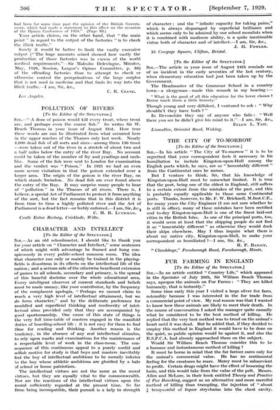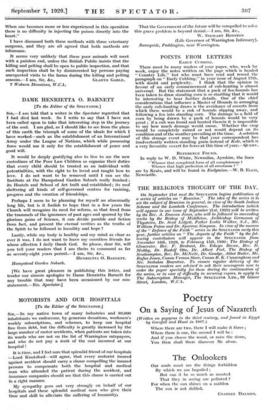FUR FARMING IN ENGLAND
[To the Editor of the SPECTATOR.] Sin,—In an article entitled " Country Life," which appeared in the Spectator of July 20th, Sir William Beach Thomas says, apropos the animals on Fur Farms : " They are killed humanely, that is instantly."
Some time early this year I visited a large silver fox farm, ostensibly because I was interested in the fur trade from a commercial point of view. My real reason was that I wanted to know how these animals are likely to meet their death. In the course of conversation I asked the manager quite casually what he considered to be the best method of killing. He replied that the very best method was to tread on the animal's heart until it was dead. But he added that, if they decided to employ this method in England it would have to be done on the quiet, as public opinion would be against it, and also the R.S.P.C.A. had already approached them on the subject.
Would Sir William Beach Thomas consider this to be a humane and instantaneous method of killing ?
It must be borne in mind that the fur farmer cares only for the animal's commercial value. He has no sentimental feeling for the creatures he rears. Mercy must be subservient to profit. Certain drugs might have the effect of loosening the hairs, and this would take from the value of the pelt. Messrs. Allen and McLure, in their book entitled Theory and Practice of Fox Ranching, suggest as an alternative and more merciful method of killing than trampling, the injection of " about
teaspoonful of liquor strychnine into the chest cavity. When one becomes more or less experienced in this operation there is no difficulty in injecting the poison directly into the heart."
I have discussed both these methods with three veterinary surgeons, and they are all agreed that both methods are inhumane.
It seems very unlikely that these poor animals will meet with a painless end, unless the British Public insists that the killing and pelting shall be open to public inspection, and that such inspection shall be by disinterested lay persons paying unexpected visits to the farms during the killing and pelting

































 Previous page
Previous page